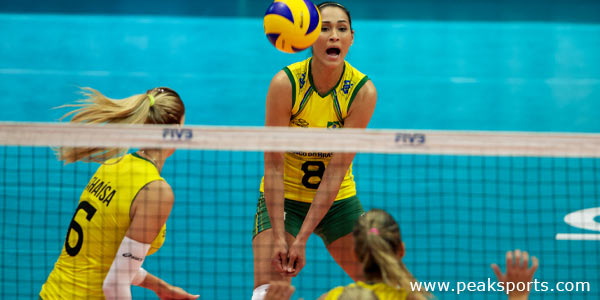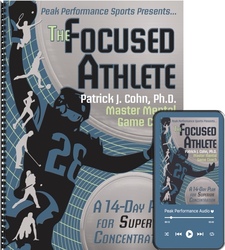
Improve Success in Sports With Mental Imagery
Is mental imagery a gimmick or a useful mental game skill to improve athletic performance?
In fact, many athletes have found a lot of success using visualization daily in their training regimes.
They mention several benefits that they received through visualization, including:
- More confidence
- Better focus
- Poise under pressure
- Greater consistency
- Improvement in the ability to focus
If so many successful athletes visualize, what exactly is holding you back from adopting this reliable performance enhancement strategy?
Most athletes use mental imagery naturally when they practice and compete. They just don’t call it this…
–Soccer players “see” the entire field in their minds.
–Golfers visualize a putt from behind the ball.
–Tennis players feel a solid serve as they step up to the line.
–Football players see the play in their heads.
Like these other players, you too can benefit from using mental imagery to your advantage. There are several ways to use it.
You can use it prior to practicing any skill. The key is to use a style that is comfortable for you…
I (Dr. Cohn) was working with a PGA Tour Pro at Bay Hill a few years ago and we started talking about routines and visualizing golf shots.
He said: “I can’t really see the shot in my mind, but I’ve heard so many players talking about it including Jack Nicklaus.”
“Why can’t I see a shot in my mind when I try so hard to and everyone else can?”
I said to the golfer, that’s not your preference of learning and performing…
See, not everyone can actually “visualize” their shots or see the path of the ball because some players are more kinesthetic or feel-oriented, which is not a bad thing.
So we started talking about what “images” he could use in his routine to take advantage of mental imagery.
If you’re predominately a “feel” player, you might think about good balance, tempo, or feeling free with your swing.
Try thinking back to a game or performance where you played well. Did you use certain types of images when competing? You can try to replicate the same images today.
But you certainly don’t want to force yourself into a style of imagery that doesn’t suit you.
It doesn’t matter if you are shooting free-throws or kicking field goals, the same concept applies: use the right images for your learning style.
It is good to keep in mind that many athletes are a combination of visual, kinesthetic, auditory, and tactile learning styles. So use the images that work for you!
The images in your mind prime your mind and body for success by imprinting successful outcomes in your mind.
Wizards center Ian Mahinmi puts it this way, “It [positive imaging] is like building muscle memory, but for your brain.” It’s really motor memory, but coaches refer to is as muscle memory.
Mental Imagery and Your Performance
1. Relax and get comfortable. This will help quiet your mind.
2. See and/or feel yourself performing how you want to in competition.
3. Use as many senses as possible to have a more realistic experience.
4. Rehearse only positive outcomes in the beginning.
5. Immerse yourself in the emotions you would experience when performing successfully.
Bonus tip: Make sure you tap into your dominant learning and performing style when using mental rehearsal. Are you primarily a visual learner or a feel-oriented learner?
You can improve the mental skill of visualization with practice. Use your imagination to program yourself for success!
Related Sports Psychology Articles
- How Elite Athletes Use Visualization
- How to Compete Well in Pressure Moments
- How Preparation Boosts Confidence
*Subscribe to The Sports Psychology Podcast on iTunes
*Subscribe to The Sports Psychology Podcast on Spotify
Download a free sports psychology report to improve your mental game!
Learn more about our one-on-one mental game coaching.
The Focused Athlete

It’s probably no secret that you have many opportunities to become distracted in sports. Athletes are bombarded with both internal and external distractions everyday in practice and competition. Focused athletes are able to get the most from their skills because they are more efficient with practice and more concentrated in competition. Athletes who lack focus let distractions run wild through their mind and don’t know how to adjust or refocus.
The Focused Athlete was developed for any level coach, parent, or junior to professional athlete who wants to improve performance and gain a competitive edge. It does not matter if you are a fledgling junior athlete; or a seasoned professional, plagued with distractions; or you just wanting to learn how to improve concentration…
“The Focused Athlete” is a complete system to teach you how to focus like a champion and harness the power of a zone focus every time you step on the playing field, court, track, or course in practice and games!
